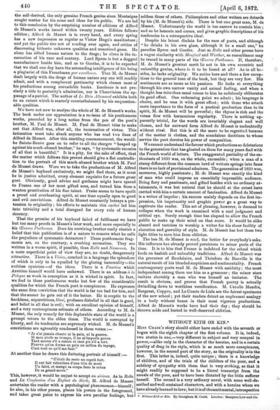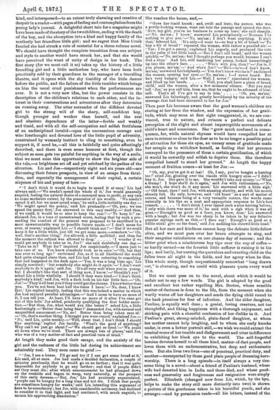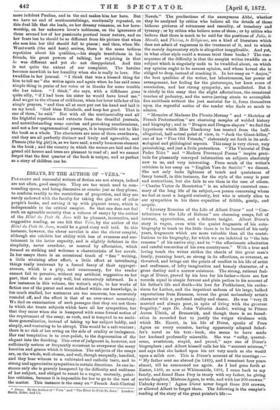WITHOUT KITH OR KIN.*
Miss CRAM'S story should either have ended with the seventh or begun with the eighth chapter of the first volume. It is, indeed, two stories in one,—very different in subject and very unequal in power,—alike only in the character of the heroine, and in a certain quality of drag in the style, which is as much more conspicuous, however, in the second part of the story, as the originality is in the first. This latter is, indeed, quite unique ; there is a knowledge of children, and of the trials of the children of the poor, and a subtlety of sympathy with them that is very striking, so that it might readily be supposed to be a literal transcript from the annals of the poor, and to have been dictated by the little sufferer herself. The second is a very ordinary novel, with some well-de- scribed and well-sustained characters, and with a heroine whom we have alreadylearned to love; but it is of thesentimentel, introspective * Without Kith or Kin. By Georgians M. Orsik. London : Sampson Low and Co.
kind, and interspersed—to an extent truly alarming and creative of despair in a reader —with pages of feeling and contemplationfrom the young lady's journal. A delightful short tale for a magazine might have been made of thestory of the twochildren, ending with the death of the boy, and the absorption into a kind and happy family of the motherly but friendless little girl ; and we regret that Miss Craik fancied she had struck a vein of material for a three-volume novel. We should have thought the complete transition from one subject and style to another would have struck her, and that she would have perceived the want of unity of design in her book. The first story (for we must call it so) takes up the history of a little foundling girl and a little motherless boy, who have been both practically sold by their guardians to the manager of a travelling theatre, and it opens with the shy timidity of the little dancer before the public, and the failure of the little tumbler which brings on him the usual cruel punishment when the performances are over. It is not a very new idea, but the power consists in the description of the children's relations to each other, and the in- terest in their conversations and adventures after they determine on running away. The utter surrender of the diffident devoted girl to the strong will of the sharp, self-confident boy, though younger and weaker than herself, and the real and absolute dependence of the latter—feeble and weakly and timid, and with all the self-occupation and selfish fretfulness of an undisciplined invalid—upon the unconscious courage and wise forethought and devoted love of the little pupil of adversity, constrained by womanly instinct to cling to something, even to support it, if need be,—all this is faithfully and quite affectingly described, and there is even some humour at first, though the subject so soon gets too painful for anything in the way of a smile, that we must seize this opportunity to show the brighter side of the tale,—a brightness set off and yet subdued by the pathos of the situation. Liz and Joe—respectively eight and six years old—are discussing their future prospects, in view of an escape from thral- dom, and especially the management of their capital, a certain sixpence of his and penny of hers :-
"'I don't think it would do to begin to spend it at once,' Liz had always said.—'We needn't spend the whole of it,' Joe would generally respond, feeling the natural desire of a moneyed man to profit, at any rate to some moderate extent, by the possession of his wealth. 'We needn't spend it all, but we must spend some,' he said a little irritably one day.— 'We might spend the penny,' said Liz prudently.—' Oh, yes ; we can spend the penny first,' Joe answered to this very readily.—' And then, U we could, it would be so nice to keep the rest To keep it!' ex- claimed Joe, in a tone of unrestrained scorn, feeling that by such a pro- ceeding the comfort of the present was proposed to be sacrificed in a most unwarrantable way to possible future needs.—' I don't mean for
ever, of course,' explained Liz.—' I should think not But if we could keep it for a little while, just till we get some more—somehow.'—' Oh, well, that's another thing,' Joe allowed, a little mollified : and then for the moment the subject was allowed to drop.' . . . . . ' I wonder if we could get anybody to take us in, Joe ? ' she said doubtfully one day.— ' Take us in? What for?' inquired Joe suspiciously.—'I mean just to take care of us. You know somebody took us in once.'—' Oh, but that was ever so long ago!' exclaimed Joe, as if in all likelihood the world had quite changed since then. and Liz had been referring to something that had happened in the dark ages.—' Yes, it was a long time ago,' Liz simply assented ; 'but somebody else might do it again.'—' I don't want anybody to do it again,' said Joe. 'It's all very well when you're young, but I shouldn't like that sort of thing now, I know.'—' Shouldn't you ?' asked Liz a little wistfully. I should if they were kind.—' I don't think anybody's kind,' said Joe, with a dark look on his fair little face.—' Oh, Joe !'—'They'd all beat you if they could get the chance. I know better than you. You've not been beat half the times I have.'--' No, dear, I know that,' Liz replied humbly, feeling that this was indeed a matter in which Joe had enjoyed peculiar advantages.—' And I mean to have no more of it, I can tell you. At least, I'll have no more of it after I've once got out of this hole,' Joe added, prudently qualifying the first bolder asser- tion.—' But then, Joe, what would you like better ?' asked Liz, a little hesitatingly.—' Better than being beat ?' demanded Joe, with natural and unqualified amazement.—' No, no! Better than being taken care of.' —' Oh, that's another thing. I thought you were crazed,' explained Joe.— '" No,' said Liz, quite meekly.—' Well, about that, I don't think I should like anything,' replied Joe lucidly. What's the good of anything? Why can't we just go about ?'—' We should get so tired.'—' We could sit down when we're tired. There are always lots of places,' said Joe, who was of a very matter-of-fact and practical turn of mind."
At length they make good their escape, and the anxiety of the girl and the rashness of the little lad during its achievement are admirably real. They soon come to grief :—
" 'Joe, I see a house. I'll go and try if I can get some bread at it,' Liz said, all at once. Joe had made a decided declaration, a couple of minutes previously, that he would go on no farther; • that it was quite impossible for anybody to go any farther; and that if people didn't eat they must die ; after which announcement he had plumped down on the roadside and begun to weep, very naturally, at the prospect of this early decease.—'But, Joe,' Liz had anxiously expostulated, 'people can be hungry for a long time and not die. I think that people are sometimes hungry for weeks,' said Liz, intending this argument of hers to be consolatory ; but Joe with considerable acrimony, had declined to consider it in that light, and had continued, with much anguish, to mourn his approaching dissolution." She reaches the house, and,— " Gave her timid knock ; and, swift and irate, the person, who was a portly-looking woman, went out into the passage and opened the door. 'Now, my girl, you've no badness to come up here,' she said sharply. = No, ma'am ; I know,' answered Liz precipitately.—' Because I've nothing to give you.'—' No, ma'am ; I don't want anything. It ain't that,' faltered Liz. 'It's only—I want to—to buy a bit of bread.'—' To buy a bit of bread ?' repeated the woman, with rather a puzzled air.'— ' Yes; I've got a penny,' explained Liz eagerly, and produced the coin in the palm of her little hand.—' But I don't sell bread,' said the woman quickly.= No, ma'am ; but I thought perhaps you would, because I can't find a shop.' And Liz, still tendering her penny, looked beseechingly
up into the other's face Who's with you, then ?'—' Joe is, if you please, ma'am.'—' And who's Joe? '—' He's—he's—I don't know, ma'am,' answered Liz helplessly.—' You don't know who he is?' exclaimed the woman, opening her eyes.—' No, ma'am ; I—I never heard. But he's very hungry,' said Liz.—' Well, I never !' ejaculated the woman, and lifted up her hands 'Well, you shall have a piece of bread, child,' said the woman, after a few moments' silence. 'Bat you may tell Joe,' as you call him, from me, that he ought to be ashamed of him- self. That's all I've got to say to him.' Oh, yes, ma'am,' answered Liz falteringly, and greatly bewildered by the severity of the message that had been entrusted to her for Joe."
Then poor Liz becomes aware that the good woman's children are staring at her from the window, and the expression of her grati- tude, which may seem at first sight exaggerated, is, we are con- vinced, true to nature, and evinces a perfect and delicate perception of the slight and almost imperceptible movements of a child's heart and conscience. She " grevi much confused in conse- quence, for, while natural shyness would have compelled her at once to retreat so close to the doer as to be no longer a possible point of attraction for these six eyes, an uneasy sense of gratitude made her scruple so to withdraw herself, as feeling that her presence conveyed to the possessors of them a certain gratification, of which it would be cowardly and selfish to deprive them. She therefore compelled herself to stand her ground." At length the happy moment of fruition comes—at least for Joe :— " Oh, my, you've got it at last! Oh, I say, you've bought a herring too cried Joe, gloating over the viands with hungry eyes.—' I didn't buy it, Joe. She gave it to me. She wouldn't take any money.'—' What a trump! I hope she'll do it again,' said Joe with enthusiasm.—' No, she won't, she won't do it any more,' Liz answered with a little sigh.' = Old beast, then !' said Joe, with amazing alacrity, and with his month already full. He only, however, said old beast' as a sort of matter of course, and because being of a very versatile nature, the words came naturally to his lips as a neat and appropriate response to Liz's last remark '1 don't think I ever tasted such a nice herring before; I only wish there was more of it,' he said with a sigh when it was all gone.—' Enough'a as good as a feast, you know, dear,' Liz answered with a laugh ; but Joe was too sharp to be taken in by any delusive popular sayings such as this.—' I dare say! Enough's as good as a fiddle-stick! give me the feast,' said Joe nodding his shrewd little head."
But all her care and kindness cannot keep the delicate little fellow alive, and we must pass over her brave attempts to sing, and their sanguine calculations on one chance day of success ; and the bitter grief when a mischievous boy tips over the cup of coffee— so hardly earned—as the feverish little sufferer is raising it to his lips ; and lastly, her nursing the querulous and exacting child on the fallen trees all night in the fields, and her agony when he dies. This whole story, though unquestionably somewhat "long drawn out," is charming, and we could with pleasure quote every word of it.
But we must pass on to the novel, about which it would be unfair not to say a few words. The girl is adopted by the good and excellent but rather repelling Mrs. Breton, whose sensible matter-of-factness is done to the life, from the moment when she warily warns off her daughters and sends the dying child round to the back premises for fear of infection. And the elder daughter, Pauline, is equally well done ; a genial, loving creature, not too thoughtful, and liking happiness with a thorough enjoyment, and shirking pain with a cheerful confession of her dislike to it. And Pauline's great, strong-minded, plain-faced daughter, at whom her mother cannot help laughing, and to whom she early knocks under, is even a better portrait still,—we wish we could extract the comical scene of her tumble and disfigurement and utter indifference to exhibiting her black eye to the world. The self-forgetful heroine devotes herself to all these kind, matter-of-fact people, and loves them with an undemonstrative, but deep and enthusiastic
love. But she lives two lives—one of punctual, practical duty, and another—unsuspected by these good plain people of dreaming hero- worship. There is a long episode—in itself always a very tire- some thing in a novel—about a friend of Pauline's husband, whose wife had deserted him in India and there died, and whose good-
ness and generosity and forgiveness and resignation were simply
perfect. Elizabeth (changed now from Liz, which, by the bye, helps to make the story still more distinctly into two) is shown
a picture of this gentleman taken in his beautiful youth, and she arranges—and by permission reads—all his letters, instead of the
more indolent Pauline, and in the end makes him her hero. But we have no end of sentimentalisings, continually repeated, on this dual life that she leads, on her dreamy romance, on her hero- worship, on her unknown lover's nobleness, on the ignorance of those around her of her passionate poetical inner nature, and on her fears lest he should be so different from his picture that when she sees him her idol should fall to pieces ; and then, when Mr. Wentworth (the said herb) arrives, there is the same tedious repetition about his qualities,—his simple trustfulness in his friends, his great powers of talking, her rejoicing in that he was different and yet she not disappointed. And this is not quite the extent of our complaint. The heroine becomes mawkish in her humility when she is really in love. She twaddles in her journal. "I think that was a blessed thing for him to tell me" she writes again and again when he has said some simple thing in praise of her voice or in thanks for some trouble she has taken. "I think," she says, with a diffidence gone quite silly, "if I had been his sister he would have loved me." And we get to the climax of sickliness, when her lover tells her of his simple prayers, "and then all at once put out his hand and laid it on my head. 'God bless Elizabeth, and keep her good. That is one of them,' he said." But with all the sentimentality and all the frightful repetition and extracts from the dreadful journals, and notwithstanding some careless and provoking anachronisms, and not a few ungrammatical passages, it is impossible not to like the book as a whole. The characters are none of them overdrawn, and they are all perfectly distinct- and lively and agreeable, and Phemie (the big girl) is, as we have said, a really humorous element in the book ; and the country in which the scenes are laid and the grand old houses and trees are pleasant to read of ; and we cannot forget that the first quarter of the book is unique, and as perfect as a story of children can be.




































 Previous page
Previous page